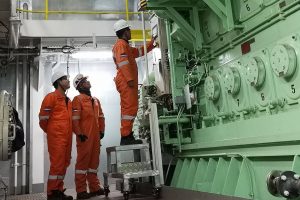
The Engineering Department’s role in maritime operations is of paramount importance, as it directly impacts the safety and efficiency of vessel handling. Engine cadets and students aspiring to become marine engineers must grasp the significance of their responsibilities within this department. Here, we delve into the key points that emphasize the critical role played by the Engineering Department in ensuring the vessel’s safety and efficient operation:
Preparation
Preparation is the foundation of safe and efficient vessel handling. The engine department plays a pivotal role in this process by meticulously inspecting and verifying the readiness of critical systems. Ensuring that the main engine, steering gear, and auxiliary equipment are in optimal condition is essential to navigate with confidence. Before manoeuvring, ensure all engine room systems are fully operational. Conduct thorough checks on the main engine, steering gear, and auxiliary equipment.
- System Readiness: Verify the operational status of all machinery in the engine room, particularly the main engine, auxiliary engines, and steering gears.
- Pre-Manoeuvring Checks: Perform pre-manoeuvring checks as per the ship’s checklist, which typically includes testing the steering gear, manual control from the engine room, and checking the availability of tugs if used.
- Equipment Warm-Up: Ensure that all machinery is at the correct operating temperature and pressure levels to respond instantly to commands.
Communication
Effective communication is the linchpin of successful maritime operations. Within the engine department, maintaining a seamless connection with the bridge is paramount. The timely exchange of information about the engine’s status and its responsiveness ensures that maneuvering proceeds smoothly and in accordance with navigational intentions. Maintain clear and constant communication with the bridge. Quick and accurate relay of information regarding engine status and responsiveness is crucial.
- Bridge-Engine Communication: Establish a direct communication line with the bridge. Use sound-powered phones, walkie-talkies, or internal communication systems to ensure reliable communication in case of electronic failures.
- Engine Orders Clarity: Confirm all engine orders received from the bridge to avoid miscommunication. Repeat orders back to the bridge when received to ensure accuracy.
- Feedback Loop: Provide immediate feedback to the bridge about the engine’s status and any potential issues affecting manoeuvring capabilities.
Responsiveness
Maneuvering at sea demands swift and precise responses to changing circumstances. The engine department must be primed for immediate action in response to telegraph orders. The ability to adapt to rapid changes in engine orders is critical, especially during intricate maneuvers that require frequent adjustments in engine speed. Be prepared for rapid changes in engine orders. Quick response to telegraph orders is vital during manoeuvring when engine speed adjustments are frequent.
- Engine Telegraph: Stay attentive to the engine telegraph at all times. Engine orders may change rapidly, requiring immediate action.
- Standby Mode: Keep the main engine on standby for immediate manoeuvring, especially when in confined waters or during berthing operations.
- Contingency Planning: Have a clear plan for quick actions in case of machinery malfunction or failure during critical maneuvers.
Situational Awareness
Situational awareness is the cornerstone of effective maneuvering. Engine cadets and students must comprehend the intricacies of the maneuvering plan and anticipate the specific engine demands associated with various maneuvers, such as berthing or unberthing. This foresight enables them to align the engine’s performance with the vessel’s navigational needs. Understand the maneuvering plan and anticipate the engine demands that different maneuvers require, such as berthing or unberthing.
Team Coordination
Harmonious teamwork within the engine department is instrumental in achieving seamless operations. Each member of the engine team should be acutely aware of their responsibilities and work cohesively. This collaborative effort not only ensures smooth engine operation but also enables rapid responses to unforeseen situations. The engine team must work in harmony, with each member aware of their responsibilities. Teamwork ensures smooth operation and quick response to any situation.
Safety Measures
Safety is non-negotiable in maritime maneuvering. Complex operations during maneuvering have inherent risks, which is why strict adherence to safety protocols is imperative. Engine cadets and students must prioritize safety at all times to mitigate potential accidents. Always adhere to safety protocols. Maneuvering often involves complex operations that can lead to accidents if safety measures are not followed.
Engine Monitoring
Vigilant engine monitoring is a critical aspect of engine department responsibilities. Close scrutiny of engine parameters is essential to detect any anomalies promptly. Any irregularities must be reported immediately to ensure the engine’s continued reliability. Monitor engine parameters closely. Anomalies must be detected and reported immediately.
Fuel Management
Fuel management is a key consideration in modern maritime operations. Engine cadets and students should be mindful of fuel consumption and the type of fuel being used, especially when navigating near shore. Adhering to regulations regarding the use of low-sulfur fuels is essential to minimize environmental impact. Be mindful of fuel consumption and the type of fuel used, especially when regulations require switching to low-sulfur fuels near shore.
Emergency Preparedness
Preparedness for emergency situations is a fundamental aspect of maritime training. Engine cadets and students should be well-versed in emergency procedures and engage in regular drills. This level of readiness ensures that the engine department can respond effectively in critical situations. Be prepared for emergency maneuvers. Regular drills and knowledge of emergency procedures are essential.
Post-Maneuvering Checks
The conclusion of manoeuvring doesn’t mark the end of responsibilities for the engine department. After manoeuvring, a comprehensive check of the engine and related systems is essential. This thorough examination ensures that all systems are functioning correctly, contributing to the overall safety and efficiency of vessel handling. After maneuvering, perform a thorough check of the engine and related systems to ensure everything is functioning as it should be.
For cadets and ship engineers, these operations provide a rich learning experience, emphasizing the importance of precision, safety, and teamwork in the engine department’s contribution to the vessel’s navigation.

